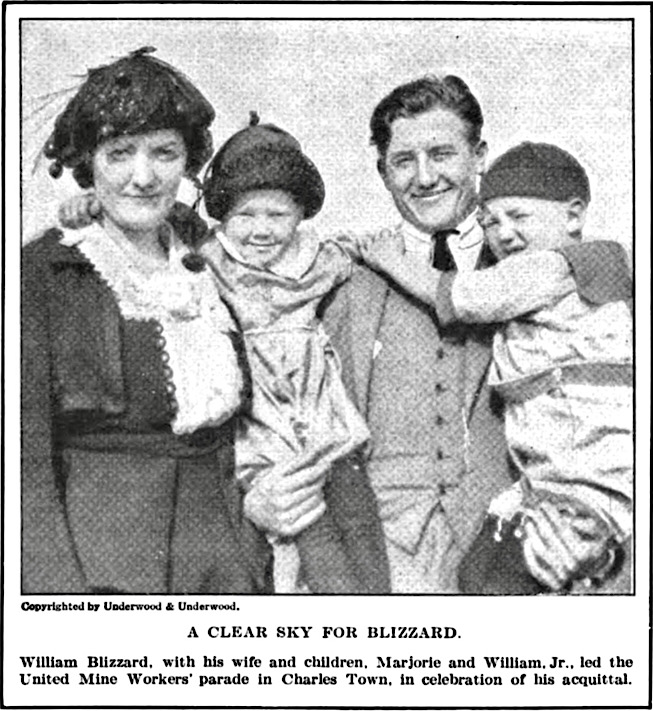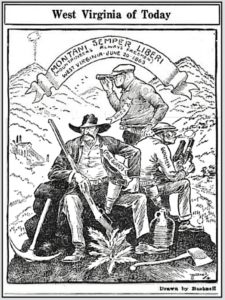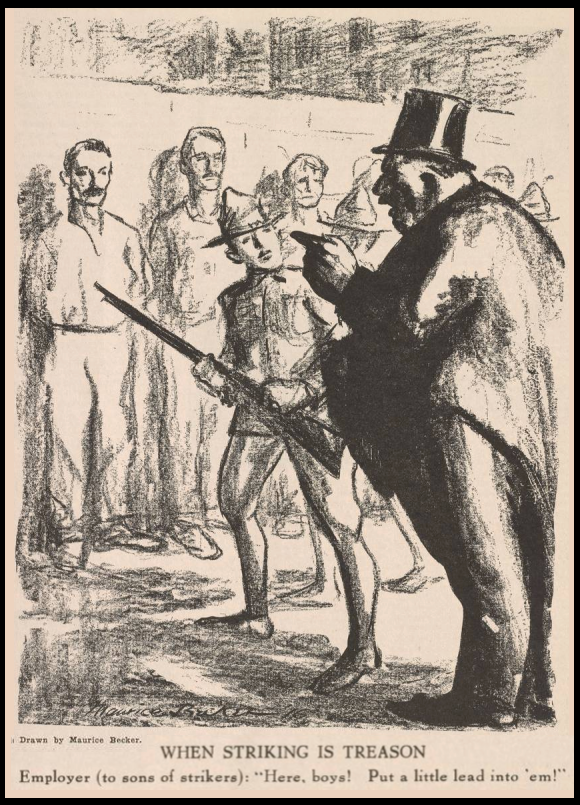 —————
—————
Hellraisers Journal – Monday September 4, 1922
Charles Town, West Virginia – Miners on Trial for Treason Against the State, Part II
From The North American Review of September 1922:
THE MINERS AND THE LAW OF TREASON
BY JAMES G. RANDALL
[Part II of II]
Turning to the case of the miners, we find that the offense for which they (or rather a selected number of them) are held is treason against the State of West Virginia. In the Constitution of the State of West Virginia there is the following provision:
Treason against the State shall consist only in levying war against it, or in adhering to its enemies, giving them aid and comfort. No person shall be convicted of treason unless on the testimony of two witnesses to the same overt act, or on confession in open court. Treason shall be punished, according to the character of the acts committed, by the infliction of one or more of the penalties of death, imprisonment or fine, as may be prescribed by law.
It will be noticed that the provisions in the West Virginia Constitution resemble those of the Federal Constitution in the definition of the offense and the requirements as to evidence sustaining the overt act, but that the State Constitution goes farther than that of the United States in that it specifies the general nature of the punishment. An examination of the West Virginia code shows that the punishment, as further defined by the Legislature, shall be death, or, at the discretion of the jury, confinement in the penitentiary not less than three nor more than ten years and confiscation of the real and personal estate. Withholding knowledge of treason, attempting to justify armed insurrection by written or printed words, or engaging in an unlawful assemblage, are punishable by lesser penalties, thus indicating that these offenses are regarded as distinct from treason itself. As to what constitutes “levying war” against the State, this is largely a matter for interpretation by the court, and it appears that Judge Woods has made considerable use of Federal as well as State decisions in determining his rulings.
The acts for which the miners are on trial took place in connection with the serious outbreak of August, 1921. As a climax of years of growing hostility, during which the United Mine Workers had made repeated efforts to unionize the mine fields of Logan and Mingo counties, several hundred men assembled on August 20 at Marmet, West Virginia, with the intention of making some kind of demonstration or attack, the exact purpose of which is disputed. An important feature of the case is that the Governor had previously proclaimed martial law in Mingo County, and had sent State troops into that county to preserve order. It is the contention of the prosecution that the acts of the miners constituted a defiance of this martial law, and an intention to resist the troops.
An appeal by “Mother Jones”, a well-known leader among the miners, failed to disperse them, and the armed force, picturesquely uniformed in blue overalls and red bandanna handkerchiefs, proceeded on their march. The first violence occurred at Sharples in Boone County, where a small force of State police was resisted by the miners while seeking to serve warrants upon men wanted by the Logan County authorities. Several miners were killed and from this time the march assumed much more alarming proportions. By the time the Boone-Logan county line was reached the invaders numbered about eight thousand. Don Chafin, sheriff of Logan County, raised a defending force of approximately two thousand which he commanded until, after some delay, Governor Morgan commissioned Colonel Eubanks to take charge with State troops. For over a week the opposing “armies” confronted each other over an extended mountainous battle-front in the neighborhood of Blair, and there was considerable detached fighting. On the defending side three deputy sheriffs were killed, and it was for their deaths that the indictments for murder were drawn. Probably more than twenty of the invaders lost their lives.



